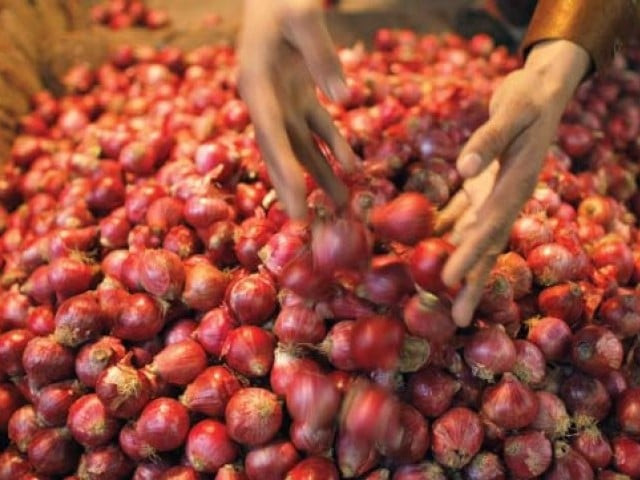After tomatoes, onion rates hit new heights
Citizens complain prices of daily commodities are skyrocketing in absence of control mechanism

PHOTO: AFP
After tomatoes, the prices of onion are touching Rs100 a kilogramme in various areas of Lahore due to an ineffective price control mechanism. Speaking to The Express Tribune, various citizens complained that onion prices had multiplied in a couple of weeks, but no efforts were made to rein in commodity the rates.
Skyrocketing vegetable prices leave citizens empty-handed
Mrs Muhstaq, a middle-aged woman, said onions were an essential commodity and had no substitute, but the government was not paying attention to the problem. “Provincial ministers, who have never visited markets to buy vegetables, are saying on TV channels that people should use yogurt or tamarind if tomato prices are high these days. I want to ask these geniuses to explain what the substitute of onion is?” she questioned.
Another citizen, Asif Hanif, highlighted that street vendors were selling onions between Rs90 and Rs100 a kilogramme, depending size and quality of the product. “I believe there is no mechanism to control prices in the city otherwise the situation would be much better,” she said.
A senior officer of the Punjab Agriculture Department revealed that unstable prices of essential commodities were the result of poor coordination among government agencies. “After passage of the 18th Constitution Amendment, though provinces have gotten autonomy, it has created a huge administrative vacuum in various sectors,” he said. The official pointed out that no government agency was monitoring production and demand or supply of essential commodities at the national level as there was no mechanism of coordination among provincial departments.
He said the national requirement of onions was around 1.7 million tonnes, which is sufficient to meet national demand. However, Punjab, being the most populated province, consumed almost 70% of national production, but it had to rely on Sindh and Balochistan which produced 7.5 million and 5 million tons, respectively. The rest was produced in Punjab.
Govt fails to control prices of tomatoes despite claims
He underscored that if like India and developed countries, Pakistan had some national crop forecasting system, such a crisis could be avoided. The official continued that decision-makers should have information on production stats and current demand in the market. He pointed out that no province can independently fulfill its requirements owing to different weather and production cycles. “For example, other provinces have to rely on Punjab for wheat. For vegetable or fruit, Punjab has to look toward other provinces."
He pointed out that last year, onion farmers in Balochistan had to face huge losses due to poor commodity, but this year they settled their losses by selling at higher rates.
LHC seeks answers
Justice Shahid Karim of the Lahore High Court sought a reply from Punjab government within two weeks on a petition against the shortage and price hike of tomatoes all over the province.
The petitioner’s counsel told the court that the prices of the tomatoes had reached to Rs.300 per kilogramme, while the government failed to control the increase in rates. He added that it also failed to meet the consumer demand of tomatoes. He urged the court to direct the government to decrease the prices of tomatoes and ensure an end to the shortage.
Published in The Express Tribune, October 13th, 2017.

1675249047-0/image-(18)1675249047-0-208x130.webp)

















COMMENTS
Comments are moderated and generally will be posted if they are on-topic and not abusive.
For more information, please see our Comments FAQ